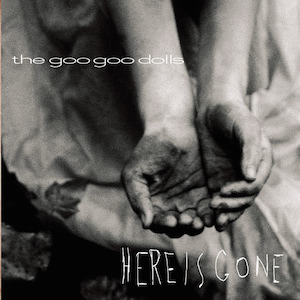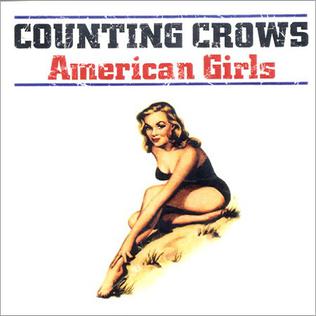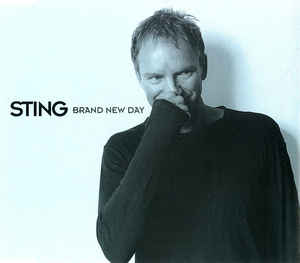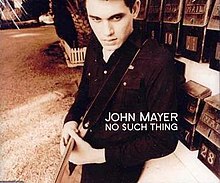
"Babylon" is a song by British singer-songwriter David Gray. Originally released on 12 July 1999 as the second single from his fourth album, White Ladder (1998), it was re-released as the album's fourth single on 19 June 2000. Described as Gray's signature song, "Babylon" is "about a love that is lost and found again".

"Sweetest Thing" is a song by Irish rock band U2. It was originally released as a B-side on the "Where the Streets Have No Name" single in 1987. The song was later re-recorded and re-released as a single in October 1998 for the band's compilation album The Best of 1980–1990.

"The Zephyr Song" is a song by American rock band Red Hot Chili Peppers, released as the second single released from their eighth studio album, By the Way (2002), on August 17, 2002. The song, as a single, was released in two parts. Both editions held two previously unheard-of B-sides, making it, collectively, hold four non-LP tracks. The single peaked at number six on the US Billboard Modern Rock chart, breaking the band's streak of three straight number-one hits.

"Hanging by a Moment" is a song by American alternative rock band Lifehouse. It was the first single released from their debut studio album, No Name Face (2000), issued through DreamWorks Records. The track was written by lead singer Jason Wade, who said that he wrote the song in about five minutes without thinking about what would happen to it. It was produced by American record producer Ron Aniello and was mixed by Brendan O'Brien. Musically, "Hanging by a Moment" is a post-grunge song that contains influences of alternative rock.

"Don't Know Why" is a song written and composed by Jesse Harris that originally appeared on his 1999 album, Jesse Harris & the Ferdinandos. A cover of the song was the debut single of American singer Norah Jones from her debut studio album, Come Away with Me (2002).

"Superman (It's Not Easy)" is a song written and performed by American singer Five for Fighting. It was released on April 16, 2001, as the second single from his second studio album America Town. Following the September 11 attacks, the song was used to honor the victims, survivors, police, and firefighters involved in the attacks.

"Slide" is a song by American alternative rock group Goo Goo Dolls. It was released as the first single from their sixth studio album, Dizzy Up the Girl, in September 1998. According to lead guitarist John Rzeznik, the song is about a Catholic girl who becomes pregnant and discusses with her boyfriend how they should respond to it. Musically, the track is a jangle pop and alternative rock song.

"Lifestyles of the Rich and Famous" is a song by American rock band Good Charlotte, written by Benji Madden, Joel Madden and Tim Armstrong for the band’s second studio album The Young and the Hopeless. It was released as the lead single from the album in August 2002 and was the band's debut European single. Upon its release, the song reached a peak of number 20 on the US Billboard Hot 100 and charted within the top 40 in several European countries, Australia, and New Zealand.

"If You're Gone" is a song by American rock band Matchbox Twenty. The song, written by the band's frontman Rob Thomas, was released on September 18, 2000, as the second single from their second album, Mad Season (2000). It reached number five on the US Billboard Hot 100 chart, becoming the band's second best-ranking song on the chart, and also became a hit on adult contemporary radio, spending two weeks at number one on the Billboard Hot Adult Contemporary Tracks chart.

"Cry" is a song by American country music singer Faith Hill. It was released as the first single from her fifth studio album of the same name (2002). The song was originally written and recorded by singer-songwriter Angie Aparo for his 1999 album, The American. In 2003, at the 45th Annual Grammy Awards, Hill won the Grammy Award for Best Female Country Vocal Performance for "Cry", marking her second win in the category.

"The Space Between" is a song written by American rock band Dave Matthews Band from their fourth studio album, Everyday (2001). Released as a single in April 2001, it gave the band their first top-40 hit in their home country, peaking at number 22 on the US Billboard Hot 100 chart. In the United Kingdom, it became the band's only top-40 hit when it reached number 36 on the UK Singles Chart. "The Space Between" is also included on the Dave Matthews Band compilation album The Best of What's Around Vol. 1.

"Unwell" is a song by American alternative rock group Matchbox Twenty. Released on February 3, 2003, as the second single from their third album, More Than You Think You Are (2002), it was written by Matchbox Twenty lead singer Rob Thomas. "Unwell" spent 18 weeks atop the US Billboard Adult Top 40 chart and two weeks atop the Billboard Hot Adult Contemporary Tracks chart. It also reached No. 5 on the Billboard Hot 100, becoming their third and final top-10 hit. Internationally, the single became a top-20 hit in Australia, peaking at No. 12, and a top-10 hit in New Zealand, peaking at No. 8. "Unwell" was nominated for a Grammy Award in 2004 for Best Pop Performance by a Duo or Group with Vocal.

"Your Body Is a Wonderland" is a song written and performed by American singer-songwriter John Mayer. It was released on June 3, 2002, as the second single from his debut studio album, Room for Squares (2001). It reached number 18 on the US Billboard Hot 100 and number nine on the New Zealand Singles Chart.

"Mouth" is a song written by Australian singer-songwriter Merril Bainbridge and produced by Siew for Bainbridge's debut album, The Garden (1995). It was released as the album's first single in October 1994 in Australia, then was re-issued in 1995. "Mouth" became her biggest hit, peaking at number one on the Australian ARIA Singles Chart for six consecutive weeks and in Canada for one week. The song also became a top-five hit in Iceland and the United States and reached number 17 in New Zealand.

"Here Is Gone" is a song by American rock band Goo Goo Dolls. A song about yearning for a deeper relationship with someone, "Here Is Gone" was released on March 11, 2002, as the lead single from the band's seventh studio album, Gutterflower (2002). It reached number 18 on the US Billboard Hot 100 chart and number three on the Adult Top 40. The single also reached number 17 in New Zealand, becoming the group's second top-20 hit there.

"Dig In" is a song by American singer-songwriter Lenny Kravitz, the lead single from his sixth studio album, Lenny (2001). It was released in September 2001. It was used in promos by the National Basketball Association for the 2002 NBA Playoffs, as well as the ending theme for the film Returner.

"Standing Still" is a song by American singer-songwriter Jewel. Recorded in Nashville, Tennessee, the song was included on her fourth studio album, This Way (2001). Jewel wrote the song sometime after the release of her previous album, Spirit, while she was taking a break from her music career. According to Jewel, the song is about stepping back to avoid stagnation from a busy career and wanting a change of scenery from fame.

"American Girls" is a single by American rock band Counting Crows. It is the second track on their fourth studio album, Hard Candy (2002), and features Sheryl Crow on backing vocals. The song was released on May 13, 2002, and reached number one on the US Billboard Triple-A chart.

"Flake" is a song written and performed by American singer-songwriter Jack Johnson. It is Johnson's debut single and was released as the only single from his first album, Brushfire Fairytales (2001). "Flake" features Ben Harper on Weissenborn slide guitar and Tommy Jordan on steel drums.

"Brand New Day" is a song by British musician Sting, the title track of his sixth studio album (1999). The song features Stevie Wonder on harmonica. It was released as a single on 13 September 1999, peaking at number 13 in the United Kingdom and reaching the top 40 on two Canadian charts. In the United States, it peaked at number three on the Billboard Bubbling Under Hot 100 and won a Grammy Award for Best Male Pop Vocal Performance in 2000.




















